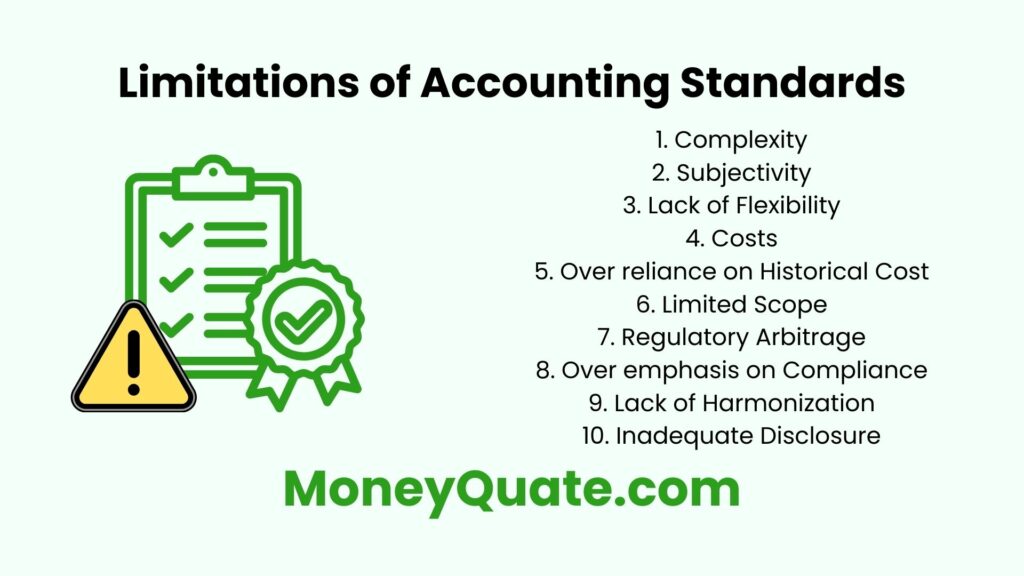Contents
- 1 Accounting Standards: The Good, the Complex, and Everything In Between
- 2 Let’s explore these bumps in the road (Limitations of the Accounting Standards)
- 2.1 Complexity Overload
- 2.2 Room for Interpretation (Subjectivity)
- 2.3 Keeping Up with Change (Lack of Flexibility)
- 2.4 Costly Compliance
- 2.5 Stuck in the Past (Over reliance on Historical Cost)
- 2.6 Beyond the Numbers (Limited Scope)
- 2.7 Playing the System (Regulatory Arbitrage)
- 2.8 Focus on the Checkbox (Over emphasis on Compliance)
- 2.9 The Global Language, with Accents (Lack of Harmonization)
- 2.10 Not Telling the Whole Truth (Inadequate Disclosure)
- 3 Conclusion
Accounting Standards: The Good, the Complex, and Everything In Between
Accounting standards are like the universal language of business.
They ensure companies “speak the same financial language” when reporting their performance.
But, just like any language, there are limitations.
While standards promote clear comparisons, they also come with some challenges.
Let’s explore these bumps in the road (Limitations of the Accounting Standards)

Complexity Overload
Imagine a recipe book written in legalese!
Accounting standards can be dense and confusing, especially for small businesses.
Understanding the rules and applying them correctly takes practice, and mistakes can happen.
Room for Interpretation (Subjectivity)
Accounting standards aren’t always black and white.
For example, imagine valuing a company car.
Is it worth what you paid for it years ago, or what you could sell it for today? This “gray area” can lead to companies reporting the same event slightly differently.
Keeping Up with Change (Lack of Flexibility)
The business world moves fast, but accounting standards can struggle to keep pace.
New technologies and business models might not have clear reporting guidelines, making it hard to accurately portray a company’s financial health.
Think of trying to use a horse-drawn carriage instruction manual for a self-driving car!
Costly Compliance
Following the rules isn’t always cheap.
Companies need to invest in training, software, and potentially extra accounting staff to ensure they’re compliant.
This can be a burden, especially for smaller businesses, who might feel like they’re drowning in paperwork.
Stuck in the Past (Over reliance on Historical Cost)
Accounting standards often focus on the original cost of something, like a building.
But what if the building’s value has increased significantly over time?
This can create a gap between what the financial statements show and the company’s true worth.
Imagine valuing your grandma’s antique furniture based on what she paid for it decades ago – it wouldn’t be very accurate!
Beyond the Numbers (Limited Scope)
Financial statements are important, but they don’t tell the whole story.
Accounting standards might not capture things like employee morale or a company’s environmental impact, which can also be crucial for success.
It’s like judging a book by its cover – the financial statements give you a good starting point, but they don’t show everything.
Playing the System (Regulatory Arbitrage)
Companies might try to take advantage of differences in accounting standards between countries.
This can make it difficult to accurately compare companies operating internationally, like comparing apples grown in the US to apples grown in China – the accounting “rules” might be different for each.
Focus on the Checkbox (Over emphasis on Compliance)
Sometimes, companies get so caught up in meeting the technical requirements of the standards that they lose sight of the bigger picture – providing a clear and insightful view of their financial health.
It’s like studying for a test just to get a good grade, without actually understanding the material.
The Global Language, with Accents (Lack of Harmonization)
Accounting standards can vary across countries. While efforts are underway to make them more consistent, differences still exist.
This makes comparing international companies a bit trickier.
Not Telling the Whole Truth (Inadequate Disclosure)
Accounting standards require companies to disclose certain information, but there might be some wiggle room.
Companies could potentially limit information or present it in a way that’s not entirely clear.
This can make it harder to get a complete picture of a company’s financial well-being.
Think of a used car salesperson – they might not tell you about all the car’s problems!
Conclusion
Accounting standards are essential for financial reporting, but understanding their limitations is key.
It allows for a more critical analysis of financial statements and a deeper understanding of a company’s true financial health.
Remember, standards are like a roadmap – they provide valuable guidance, but it’s important to be aware of their limitations and potential detours.